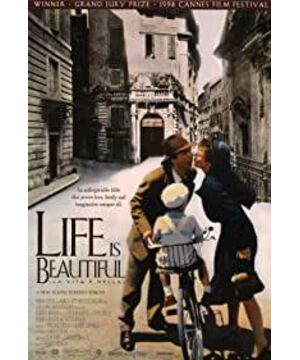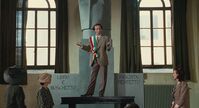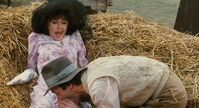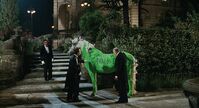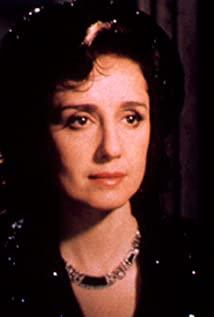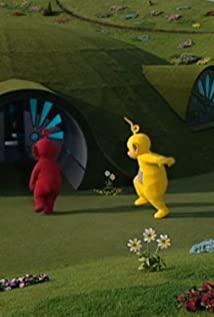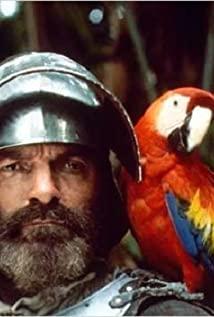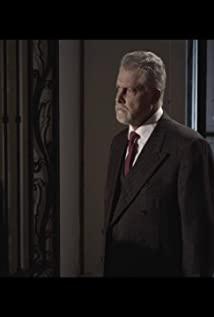The last time I wrote about the movie was about Once Upon a Time in America, but it was just an excerpt of a line and a recommendation. This time I'm going to write a film review for an Italian film - La Vita è bella (La Vita è bella).
Heard about this movie a long time ago and often confused it with A Beautiful Mind or American Beauty. While chatting with colleagues about the movie this week, she recommended it. I said that my favorite movie is "Schindler's List", and she said that you can watch "Life is Beautiful", which is completely different from "Sin". So wanted to take a look.
The 1 hour and 48 minute version, I was a little surprised, I rarely see a movie under two hours. At the beginning of the film, the hero Guido makes a loud debut, which reminds me of "When Harry met Sally". And the heroine, Dora, was born from the sky, which is the type I admire. It feels a bit like the heroine of "The English Patient".
When Guido met his uncle, he pointed out the discrimination and harassment suffered by Jews. Guido wanted to open a bookstore, but he could not get the approval of the government officials. It also showed the corruption under the Nazi system. Guido accidentally molested the administrative officer, which can be regarded as the film's first mockery of darkness. When Guido was evading the pursuit of the political officer, he bumped into Dora for the second time, and said jokingly, "It would be great if we can meet up next time." In desperation, Guido worked as a waiter. One night, I joked with my friend Ferruccio before going to bed. Ferruccio mentioned Schopenhauer's famous "will decides everything". Guido immediately experimented, and it worked. "Will decides everything" runs through the entire film, as if to tell people that happiness depends on one's attitude. And Schopenhauer was Hitler's favorite philosopher. He highly praised Schopenhauer's voluntarism. Judging from the use of "will determines everything" in the film, it is some self-comfort and coincidence. A contempt for the ruling mind.
The third time Guido met Dora was indeed standing, and Dora was still shining, but when Guido wanted to date Dora, she refused, although she was deeply attracted by the surprise that accompanied Guido. She is the fiancée of the civil servant.
Guido met the doctor when he was a waiter. The doctor was caught in the process of guessing and deciphering, and Guido was a good player. "The more the more invisible" - "darkness", "I disappear as soon as you mention me" - "silence". In the second half of the film, Guido faced the endless darkness and did not choose to remain silent.
Guido pretended to be a Berlin inspector and came to the primary school where Dora taught, and met the fourth side. The purpose of the inspector's trip was to interpret the so-called authoritative ethnologist's declaration that the Germanic nation was the most superior race. In order to play the role, Guido jokingly used himself as an example to illustrate how perfect the organs of the "superior race" were. But doesn't the ear of that race have a curved helix, an earlobe, and a navel? Here is the film's second mockery of the Nazis. At this time, Guido, as a Jew, did not feel the coming of darkness deeply.
The fifth meeting between Guido and Dora began with listening to Offenbach's "Tales of Hoffman" at the Opera House, and then designed Dora to get into his car by mistake, starting a romance full of surprises. Guido doesn't know how to drive, but he goes into battle. It seems that all romantic beginnings are related to impulsiveness and recklessness. In the rain, the red carpet was gradually spreading, the cushions acted as umbrellas... As the hero and heroine wandered, Dora began to pour out her restraint. Afterwards, a series of seemingly miraculous events surprised Dora, and she felt warm and witty in response to the various scenes that continued to appear in the front of the film. In the end Guido confessed, but the translation of the subtitles made me cringe, or it was because I was not used to Italian culture.
This is followed by the climax of the first half of the film, at the restaurant where Guido works, the celebration of the government official's announcement that he and Dora are getting married. In the meantime, Guido's uncle's horse was painted green, and the words "Be careful, Jewish horse" were written, but Guido was still not very alert at this time. At the dinner table, the primary school teacher and the administrative officer talked about an elementary school math problem. The title was "For every lunatic the country raises, it costs 4 marks a day; for every cripple, it costs 4.5 marks; for those with epilepsy, it costs 3.5 marks. The total number is 300,000. Suppose the country spends an average of 4 marks per person per day, and ask how much the country can save by eliminating them all.” The cruel question is inhumane. Blindly emphasizes how difficult such mathematical calculations are for third-grade students. It can be seen that Nazi ideology has been deeply rooted in the hearts of Italian Germanic people.
When Guido was carrying Dora's favorite chocolate ice cream and wanted to surprise her, it was just at the time when the government official announced his marriage to Dora. Dora showed no happy expression, but Guido was beaten to the core. He accidentally broke things under the table to clean up, but Dora also got under the table, kissed him, and said, "Take me away". (Oh, her neck is so beautiful!) Dora wants to pursue the happiness she wants. Guido still did not forget to surprise the goddess in his heart, and wrote "Good morning, Princess" that he often said to Dora on the special cake of the restaurant. At this moment, Dora's eyes showed a kind of radiance after the decision. Then Guido rode the repainted horse and entered the main hall. Dora climbed on the chair, stood on the table, jumped on the horse, and left the hotel gracefully, like a fairy tale. They came to Guido's house and walked in. After that, the light switching of the film seems to be just one night, which makes people think that the hero and heroine have a dark dream and a ten-mile tenderness. However, it was a four or five-year-old child who came out. Oh, they already live together and have kids.
The first half of the movie is over. This part is lighthearted and romantic, and yet at one point I wanted to cry. Because I think Guido and Dora are so happy, I envy, but I can't live as a playful life like Guido. My attitude towards life that is full of worries and can't let go will make me lose much of the happiness I dream of. ? Just thinking about this makes me want to cry.
In four or five years, the environment has changed a lot, but Guido seems to be happy as always. Guido's bookstore is open, Dora is still teaching, and little Giosué helps Dad cook the bookstore. Giosué is very much like Dora. Guido and Giosué pass by a shop whose door reads "Jews and dogs are not allowed." Giosué is puzzled, while Guido explains that each shop has different preferences. Guido himself was often taken away for questioning by the Nazis because of his Jewish identity. Terror has come.
On Giosué's birthday, both he and Guido were taken away to be sent to a concentration camp. Dora, who was not a Jew, asked to be sent to a concentration camp together. This woman who has always lived a simple life, at a critical juncture in her life, made her choice calmly and without hesitation, which moved my heart.
From the moment he entered the camp, Guido began to convince Giosué that it was a game and that there would eventually be a real tank as his birthday present. In order to continue this lie, Guido risked his life to act as a translator for the German army, although he did not understand German, just to convince Giosué of the game; after working hard every day, he had to play hard to tease Giosué, so that he could stick to the game and use it to the end prizes to encourage him. The horror and darkness of the concentration camp, Giosué was immersed in Guido's lies, and he didn't feel much. He still grew up physically and mentally.
The elderly and children in the concentration camps were killed. The Germans would lie about taking baths and leading them to the gas chambers. And Giosué escaped because he was unwilling to take a bath. This layer has foreshadowed in the front. Guido's uncle was not so lucky. Before being sent to the gas chamber, he cared about the German female soldier who almost fell down in front of her. However, the German female soldier did not appreciate it, and the ruthless expression on his angular face People shudder.
In concentration camps, men and women were separated. Once Guido was passing a radio station, sneaked in, said to the microphone, in his usual tone, "Good morning, princess. I dreamed of you last night...". When Dora heard this, in the bitterness, she must feel extremely happy. Yes, marrying a man like Guido may be ordinary, but it's really happy.
Because of meeting a doctor he had met before, Guido worked as a waiter in the concentration camp again. Surrounded by German officers,
Guido also ventured to point the phonograph's horn outside the window, playing Offenbach's "Tales of Hoffman" only for Dora to hear. Music can represent a spirit in the country of opera, Italy.
The Nazis were about to be defeated, but this was the most terrifying moment in the concentration camps. The Germans are going to carry out the final massacre. The German army doctor who was good at guessing got drunk and said something important to Guido and said to him, Guido and I both thought he was going to save Guido out, and we couldn't help but look forward to it. And finally the old doctor complained that he guessed a stupid riddle wrong. Disappointed, Guido realizes that he is alone and that any chance of survival he can only rely on himself. He tricked Giosué into hiding in an iron box, knowing that he would only come out when everyone was gone. And he was going to save Dora. He dressed in a headscarf and pretended to be a woman. He looked for Dora and disappeared. Unfortunately, he was found by a German soldier and was about to be shot on the spot. He was stopped by an officer. However, he was taken to a corner, and a simple two shots were fired before the German soldiers ran out. There was no death or any gory footage, so I still had some hope. At dawn, the German troops retreated, the living Jews gradually walked out of the camp, and Giosué also emerged from the iron box. Without Guido, my heart sinks, yes, Guido is just mortal, he can't do miracles. There was a rumbling sound, a tank drove up to Giosué, and the American soldiers came out, declaring a victory. Giosué rides in a real tank, the prize for the game his father made with him. Dora is also lucky to survive, but without Guido's life, will she be happy?
The second half of the film is shrouded in terror, but seeing Guido try his best to protect Giosué feels a power. Although the movie doesn't directly show Guido's endless longing for Dora, judging from the surprises he has brought to Dora when he has the opportunity, his love is too deep.
===================================================== ===
Guido can't be compared to Schindler because Guido is in a powerless role. However, they are both great, Schindler's great human brilliance, inspired by kindness, and Guido more from instinct.
From the point of view of film production, "Xin" is huge and diverse, the portrayal of each character is very powerful, and many aspects of human nature are explained; while the "Beautiful Life" characters are very thin, not much attention is paid to supporting roles, and their personalities are very different. very single. Of course, this is also related to the starting point of film production. Roberto Benigni originally wanted to make "Life Is Beautiful" a comedy, but this comedy comes from life, and life is always mixed.
PS: The pronunciation of Giosué is very similar to the pronunciation of my Chinese name. If I need an Italian name in the future, I will use this.
Movie Highlights:
• Nicoletta Braschi, who plays Roberto Benigni's wife in the film, is also his wife in life. (Benini is also too happy~)
• Bernini's clothes in prison are the same number as Chaplin's in "The Great Dictator".
• Bernini says the title comes from what Leon Trotsky said. When Trotsky was in exile in Mexico, when he learned that he was about to be assassinated by Stalin, he watched his wife in the garden write the words, anyway: "Life is beautiful."
• Guido played Offenbach's over a trumpet Opera Tales of Hoffman. In fact, because Offenbach was Jewish, it was difficult to find his music in the Nazi concentration camps.
View more about Life Is Beautiful reviews


